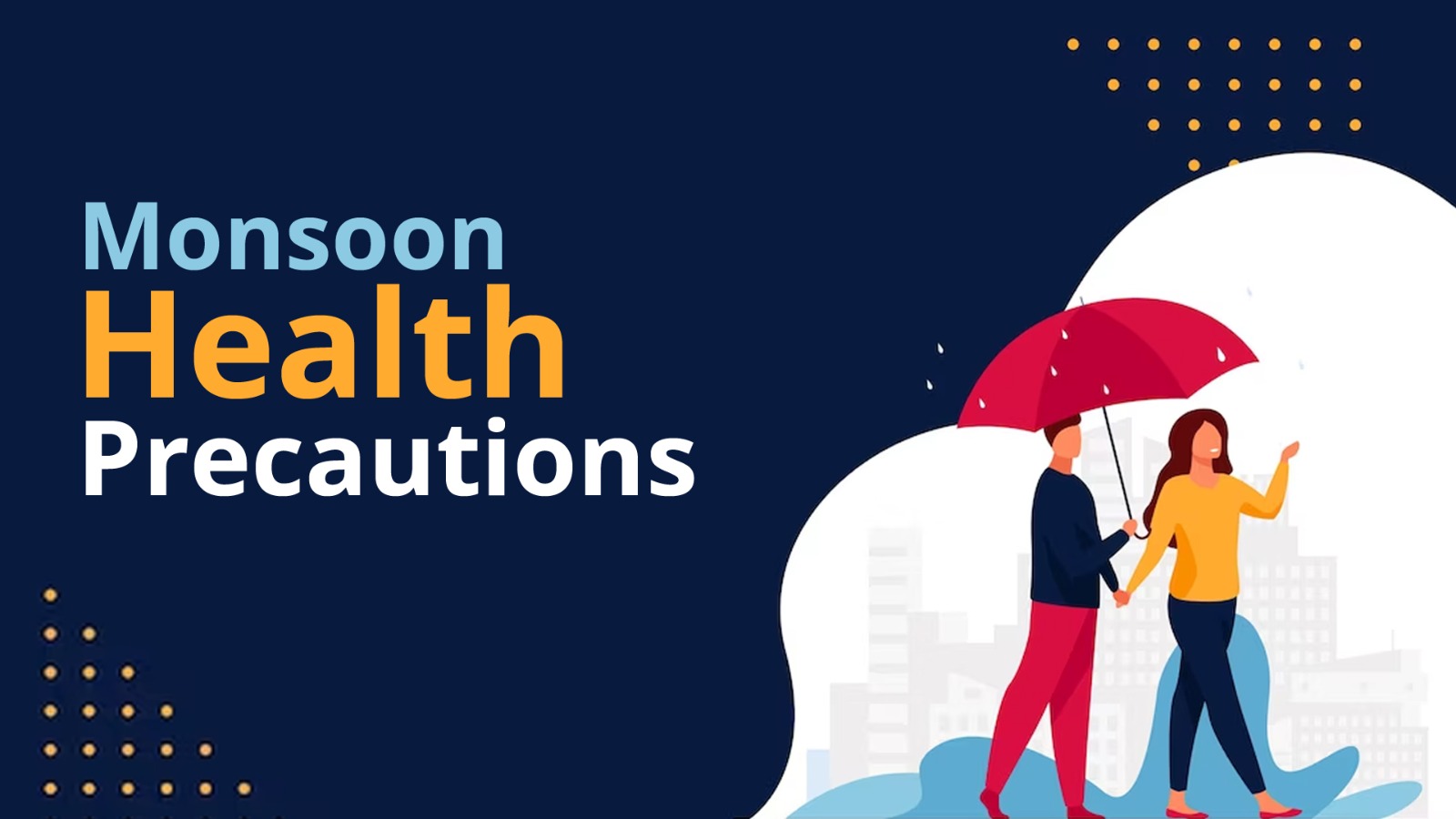What are the Health Precautions to be Taken in the Rainy Season?

Rainy Season Precautions
Introduction:
As the scorching summer heat gives way to the gentle pitter-patter of raindrops, the arrival of the monsoon season brings a much-needed sense of rejuvenation. Nature comes alive with vibrant greenery, and the earth emits a delightful aroma of damp soil, lifting the spirits of all living beings. However, amidst the beauty and freshness of this season, certain health challenges demand our attention and care. In this article, we will delve into crucial tips and precautions as said by the General Physician in Hyderabad to maintain excellent health during the monsoon, safeguarding ourselves from potential illnesses while fully embracing the enchantment of this magical time.
1.Stay Hydrated:
One might think that the rainy season doesn’t demand much hydration, but this is a common misconception. Although the temperatures drop during the monsoon, the humidity levels rise significantly. As a result, our bodies tend to lose fluids through perspiration, and the risk of dehydration remains high. To combat this, it’s crucial to drink an adequate amount of water throughout the day. Opt for purified or boiled water, and include hydrating beverages like herbal teas, fresh fruit juices, and coconut water to replenish electrolytes.
2.Maintain Personal Hygiene:
Maintaining personal hygiene is essential year-round, but it becomes even more critical during the rainy season when the risk of waterborne diseases and infections is higher. Proper personal hygiene practices can help prevent the spread of germs and bacteria, protect you from illnesses, and keep you feeling fresh and comfortable. Let’s explore in detail some key aspects of maintaining personal hygiene during the rainy season:
(a) Hand Hygiene:
Washing hands regularly and thoroughly is one of the most effective ways to prevent the spread of germs and infections suggested by the best General Physician in Kukatpally. Use soap and clean, running water to wash your hands for at least 20 seconds, making sure to clean all areas, including the back of your hands, between your fingers, and under your nails. Handwashing is essential before eating, after using the restroom, after touching potentially contaminated surfaces (such as doorknobs, public transportation handles, etc.), and after coughing or sneezing. Alcohol-based sanitisers with at least a 60% alcohol content can be used if soap and water are not available.
(b) Showering and Bathing:
Frequent showers or baths play a crucial role in maintaining clean and bacteria-free skin, while also serving as a preventive measure against fungal infections that thrive in the humid conditions of the rainy season. Utilize a gentle soap or body wash to thoroughly cleanse your body, with particular attention to areas prone to sweating, such as the underarms, groin, and feet. After bathing, ensure complete drying, especially between the toes, as lingering moisture can foster the growth of fungi.
(c) Dental Hygiene:
Ensuring proper dental hygiene is crucial for overall well-being and health. It is recommended to brush your teeth at least twice daily, preferably after meals, using a soft-bristled toothbrush and fluoride toothpaste. Flossing daily helps remove food particles and plaque from between your teeth, reducing the risk of cavities and gum disease.
(d) Clean Clothes and Footwear:
During the rainy season, your clothes and footwear are more prone to getting wet and dirty. Wearing damp clothes for prolonged periods can lead to skin irritation and fungal infections. Ensure you change into dry clothes if you get wet in the rain. Wash your clothes regularly using good quality detergent and dry them thoroughly before wearing them. For footwear, opt for water-resistant or waterproof shoes to keep your feet dry and protected from potential hazards like puddles and dirty water.
(e) Keep Living Spaces Clean and Dry:
Stagnant water and dampness in living spaces can lead to the growth of mould, mildew, and harmful bacteria. Ensure that your home is well-ventilated to allow proper air circulation and reduce humidity levels. If you experience water leakage or seepage, address it promptly to prevent the accumulation of water indoors. Regularly clean and disinfect surfaces, especially in high-traffic areas like the kitchen and bathroom, to prevent the spread of germs.
(f) Personal Grooming:
Maintaining personal grooming habits is essential for both physical and mental well-being. Keep your nails trimmed and clean to prevent the accumulation of dirt and bacteria underneath them. For those with long hair, tying it up or wearing a hat when outdoors can help prevent it from getting wet and dirty. Men should shave regularly to avoid the buildup of sweat and bacteria on facial hair.
(g) Intimate Hygiene:
Women should pay special attention to intimate hygiene during the rainy season. Keeping sanitary pads and tampons clean helps prevent the growth of bacteria. Avoid using scented products in the genital area, as they can disrupt the natural pH balance and lead to infections. Opt for cotton underwear, which is more breathable and helps to keep the area dry.
(h) Use Individual Towels and Linens:
Avoid sharing towels, handkerchiefs, and other personal items with others to prevent the spread of germs and infections. Each family member should have a separate set of towels and linens to maintain hygiene.
(i) Stay Informed:
Stay informed about health advisories and updates from local health authorities during the rainy season. Being aware of any disease outbreaks or health risks in your area can help you take necessary precautions and seek medical attention promptly if needed.
3.Choose Your Food Wisely:
During the monsoon, it’s essential to be cautious about the food we consume. The humidity can lead to the spoilage of perishable items, making them a breeding ground for bacteria and viruses. To stay healthy, opt for freshly cooked meals and avoid raw or undercooked foods. According to the General Physician in Kachiguda, leafy vegetables and fruits should be thoroughly washed and ideally soaked in a mild saline solution to remove any impurities. Additionally, prioritize hot and steaming meals, as they are less likely to harbour harmful microorganisms.
4.Boost Your Immunity:
The monsoon season tends to bring with it an upswing in seasonal illnesses such as colds, flu, and infections. To strengthen your immune system, focus on a balanced diet rich in vitamins and minerals. Eat fruits, vegetables, nuts, and seeds in moderation. Foods high in vitamin C, such as oranges, lemons, and kiwis, can be particularly beneficial. Adequate rest, regular exercise, and stress management also play a significant role in boosting immunity.
5.Protect Yourself from Mosquito-Borne Diseases:
Stagnant water acts as a breeding ground for mosquitoes, leading to an increased risk of mosquito-borne diseases like dengue, malaria, and chikungunya. To protect yourself from these illnesses, take precautionary measures such as using mosquito repellents, wearing long-sleeved clothing and pants, and sleeping under mosquito nets. Additionally, ensure that your surroundings are free from stagnant water, as this will help reduce the mosquito population.
6.Stay Active with Indoor Exercises:
Heavy downpours and waterlogged streets can make outdoor exercise challenging during the monsoon season. Regardless, staying engaged is important for keeping sound health. Embrace indoor exercises like yoga, pilates, or home workouts that don’t require outdoor access. These activities not only keep you physically fit but also contribute to mental well-being by reducing stress and anxiety.
7.Wear Appropriate Footwear:
During the rainy season, it’s vital to invest in proper footwear that protects your feet from getting wet and dirty. Waterproof shoes or rubber sandals can prevent water from seeping in, reducing the risk of fungal infections and skin-related issues. Avoid wearing tight or closed shoes for prolonged periods, as they can lead to fungal growth due to lack of ventilation.
8.Beware of Contaminated Water:
One of the significant health hazards during the rainy season is the contamination of drinking water. Waterborne diseases like cholera and gastroenteritis are prevalent during this time. Always consume water from reliable and clean sources. If tap water is not safe, ensure to boil water before drinking or use a reputable water purifier to eliminate harmful bacteria and viruses.
9.Be Cautious of Potholes and Slippery Surfaces:
The rainy season can cause roads to develop potholes and surfaces to become slippery. Exercise caution while walking or driving to avoid accidents and injuries. Stick to well-lit and familiar paths while walking, and avoid walking in areas with deep water puddles. While driving, maintain a safe distance from other vehicles, and drive at a moderate speed to ensure better control.
10.Dress Appropriately:
Choose breathable and lightweight fabrics during the monsoon season to stay comfortable and prevent skin-related issues. Cotton clothing allows better air circulation and helps to wick away moisture, reducing the chances of skin infections. Additionally, carry a small umbrella or a raincoat to protect yourself from sudden showers when you’re outside.
Conclusion:
Embracing the rainy season while maintaining good health requires mindfulness and precautionary measures. By following General Physician in KPHB, these essential tips can safeguard yourself from common monsoon-related illnesses and you can enjoy the beauty and freshness of this beautiful season. Remember, staying hydrated, maintaining personal hygiene, choosing your food wisely, boosting immunity, and protecting yourself from mosquito-borne diseases are key to a healthy and delightful monsoon experience. So, step out with confidence and immerse yourself in the wonders of nature during this enchanting time of the year.
.
.
.
.
.
For more details:
📞:: 733 733 6600 | 040 4345 4345
🌐:: https://prathimahospitals.com/book-appointment/






Warning: Undefined variable $req in /home/u885608126/domains/prathimahospitals.com/public_html/wp-content/themes/prathimahospitals/functions.php on line 294
Warning: Undefined variable $commenter in /home/u885608126/domains/prathimahospitals.com/public_html/wp-content/themes/prathimahospitals/functions.php on line 295
Warning: Trying to access array offset on value of type null in /home/u885608126/domains/prathimahospitals.com/public_html/wp-content/themes/prathimahospitals/functions.php on line 295
Warning: Undefined variable $aria_req in /home/u885608126/domains/prathimahospitals.com/public_html/wp-content/themes/prathimahospitals/functions.php on line 295
Warning: Undefined variable $req in /home/u885608126/domains/prathimahospitals.com/public_html/wp-content/themes/prathimahospitals/functions.php on line 298
Warning: Undefined variable $commenter in /home/u885608126/domains/prathimahospitals.com/public_html/wp-content/themes/prathimahospitals/functions.php on line 299
Warning: Trying to access array offset on value of type null in /home/u885608126/domains/prathimahospitals.com/public_html/wp-content/themes/prathimahospitals/functions.php on line 299
Warning: Undefined variable $aria_req in /home/u885608126/domains/prathimahospitals.com/public_html/wp-content/themes/prathimahospitals/functions.php on line 300
Warning: Undefined variable $commenter in /home/u885608126/domains/prathimahospitals.com/public_html/wp-content/themes/prathimahospitals/functions.php on line 303
Warning: Trying to access array offset on value of type null in /home/u885608126/domains/prathimahospitals.com/public_html/wp-content/themes/prathimahospitals/functions.php on line 303